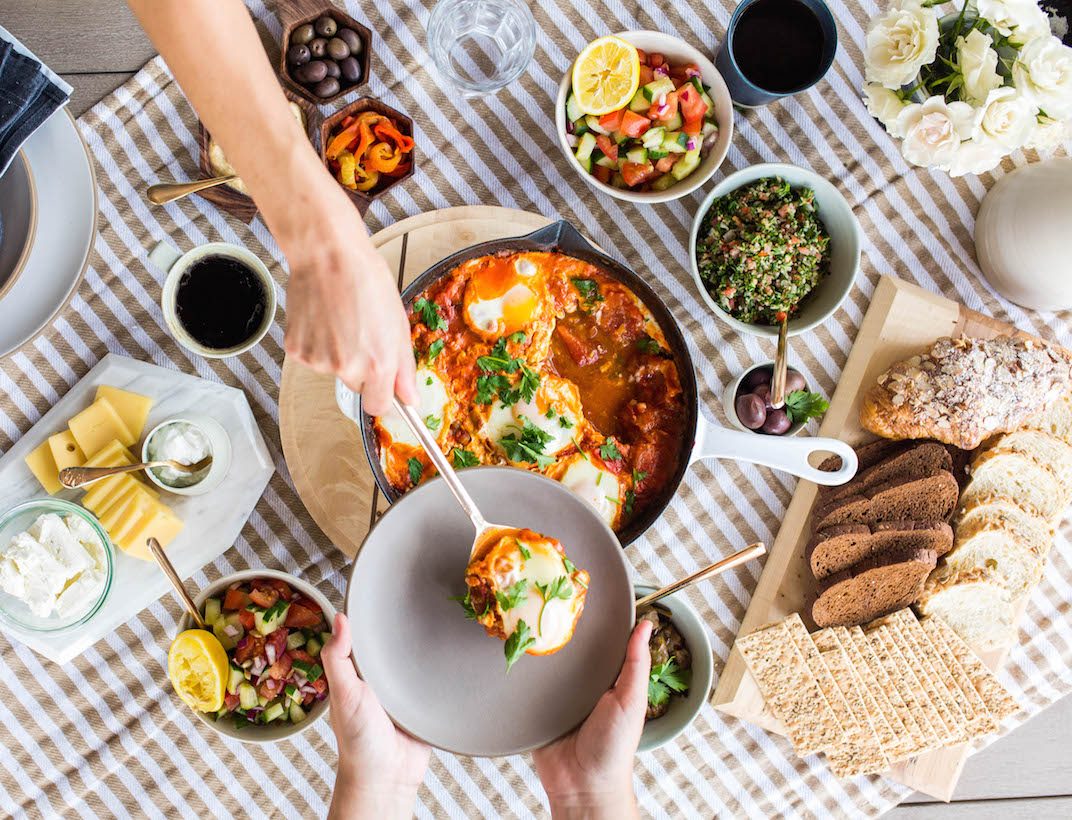12 M’sian startups shaping the future of food & agriculture that we spotted at this F&B expo
Here are local sustainable future food and agritech brands doing plant-based meats and insect proteins at Food & Drinks Malaysia 2023.
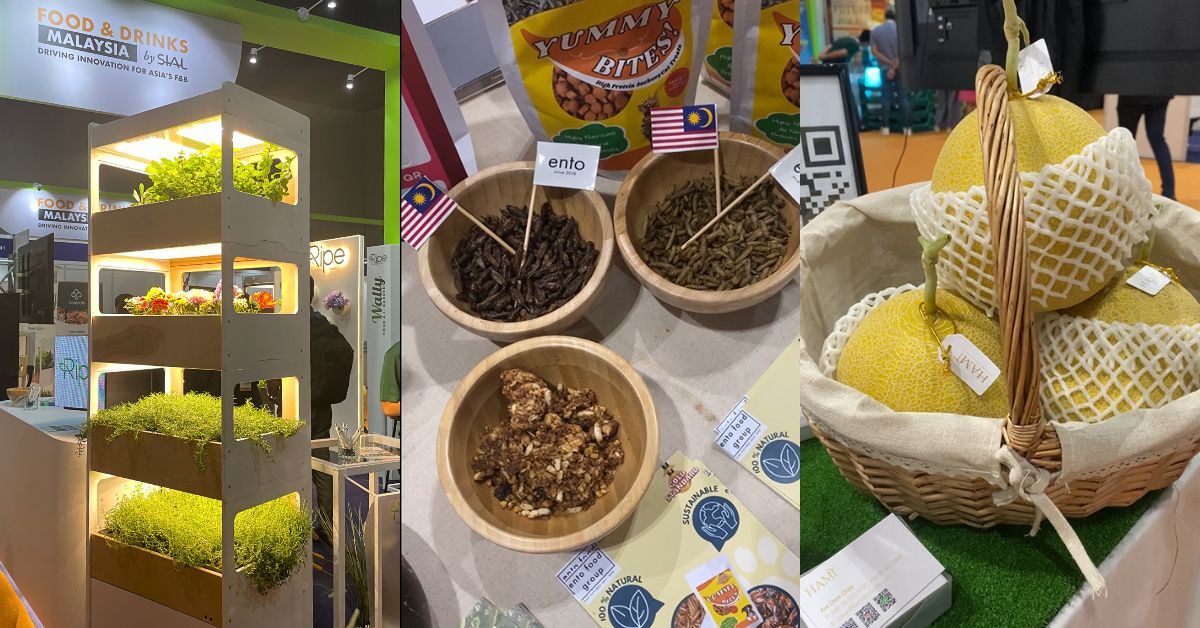
Recently, the first-ever Food & Drinks Malaysia, an international F&B exhibition and trade show by SIAL Group was held in MITEC, Kuala Lumpur.
SIAL stands for Salon International de l’Alimentation and means the Global Food Marketplace. A well-known trade fair that specialises in the food processing industry, it has now come to Malaysia through this exhibition hosted by the Comexposium Group.
From July 4 to 6, 2023, the trade show brought in around 450 exhibitors from over 22 countries and claimed to have welcomed over 150,000 visitors.
Amongst those visitors were the Vulcan Post team, and we attended with a particular reason in mind—to check out the Future of Food and Agriculture Pavillion.
Here, startups both local and from abroad that focused on future foods (such as alternative proteins) and smart agritech companies (such as ones doing hydroponics) were exhibited.
Amongst all the booths, here were 12 homegrown startups that really captured our attention.
1. ento
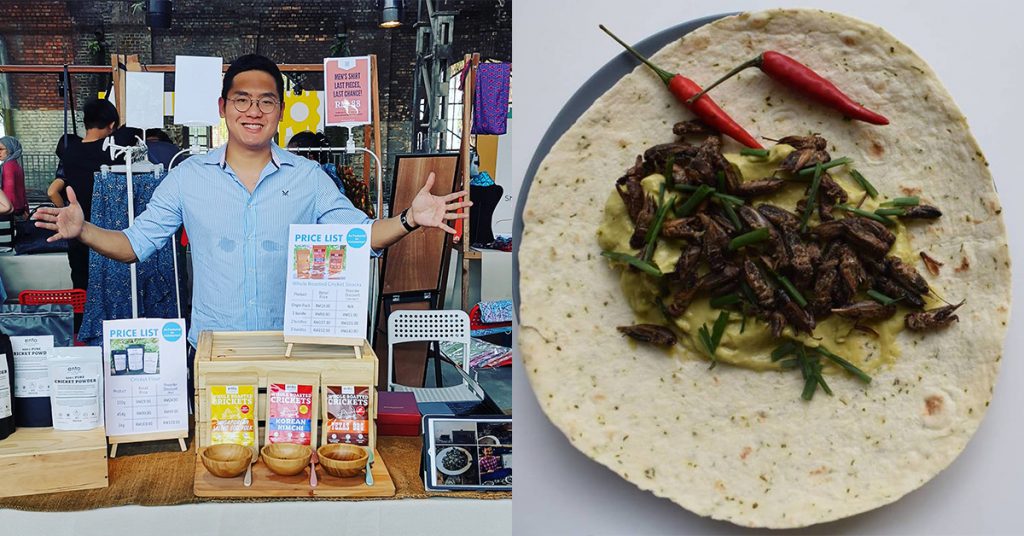 Image Credit: ento
Image Credit: entoEstablished in 2018, ento is a Malaysian startup that farms crickets for human consumption.
The brand was founded by Kevin Wu, a lawyer who left the bar to pursue this business in the name of sustainability.
Kevin shared with Vulcan Post back in 2019, “I believe everything we do ought to be sustainable. Ultimately, we cannot make decisions for short-term benefits only.”
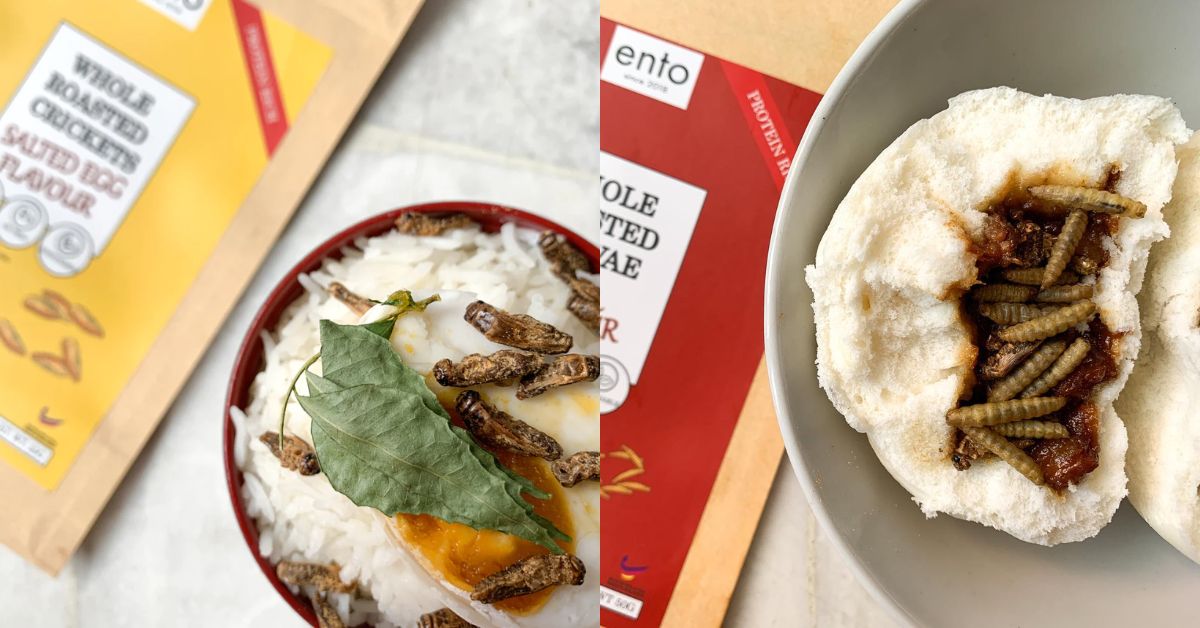 Image Credit: ento
Image Credit: entoNow, five years into the business, ento is still going strong with this ethos. They have two main offerings—roasted crickets and roasted larvae. The flavours available are BBQ, Salted Egg Yolk, Kimchi, and Original.
Other than those, ento also has 100% cricket protein powder and granola protein bites.
We were able to taste the crickets and larvae ourselves at the event. Admittedly, I’m still not completely sold in terms of the flavours and mouthfeel, but the work that ento is doing is noble enough that I can look past it.
2. Entomal
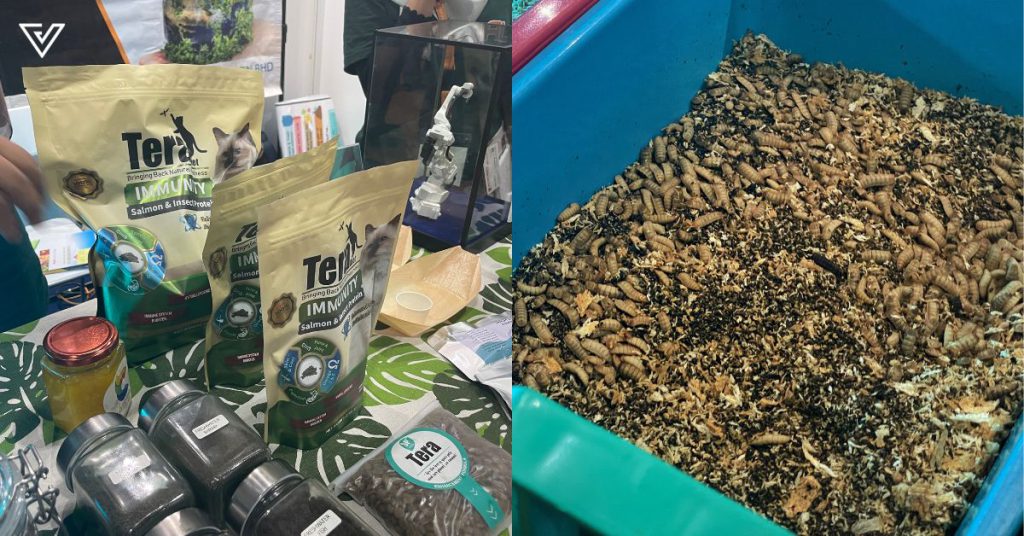 There were some larvae there for us to witness too
There were some larvae there for us to witness too A homegrown biotech startup, Entomal works with black soldier fly (BSF) larvae to carry out biowaste treatment and organic byproduct upcycling.
Essentially, the goal is to create a circular food system using BSF technology.
So far, Entomal has created food for pets. One is whole dried larvae that can be enjoyed by birds, chickens, and fishes. The other is TERA Diet, Entomal’s own brand of cat food.
While Entomal doesn’t produce food for human consumption as of yet, we were offered protein bars made with insects at the event.
Resembling a kuih raya or even a cookie, this item was salty and a little flaky. I could see it being a popular product should the Entomal team decide to launch it.
3. Ultimeat
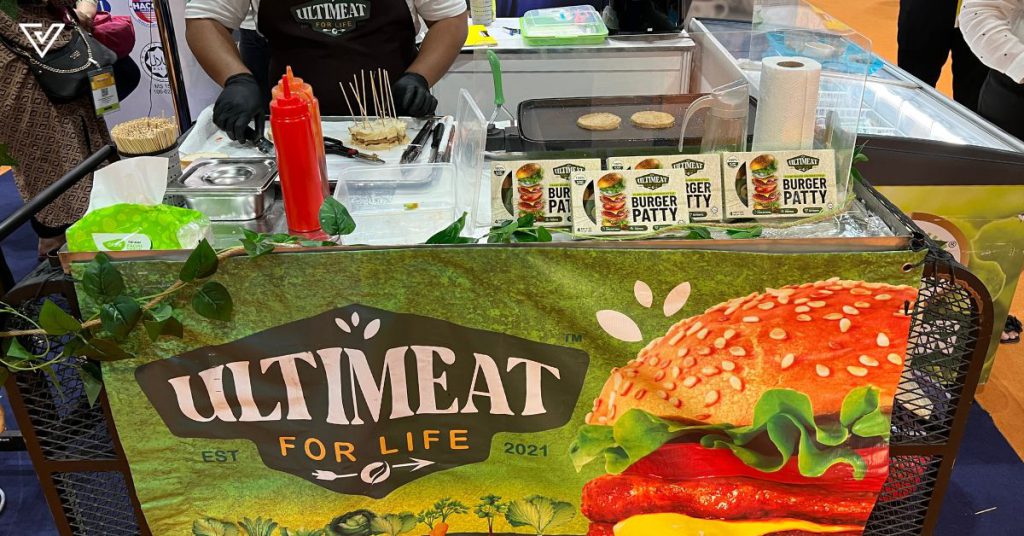
A homegrown brand established in 2021, Ultimeat creates high protein, plant-based meat products. Namely, the brand has the Ultimeat Chicken Burger Patty and the Ultimeat Chicken Nugget.
No actual fowls were harmed in the creations of these plant-based meats, though. Instead, they’re made using soy protein.
Other than its vegan patties, the parent company also has another brand, VegeWorld, that does vegetarian meats.
I was thoroughly impressed by the vegetarian lamb meat, which indeed had the gamey flavours of lamb but with a slightly softer texture.
The patty from Ultimeat also tasted very juicy, real, and flavourful, but that may have been due to the added ingredients and sauces.
4. Ripe
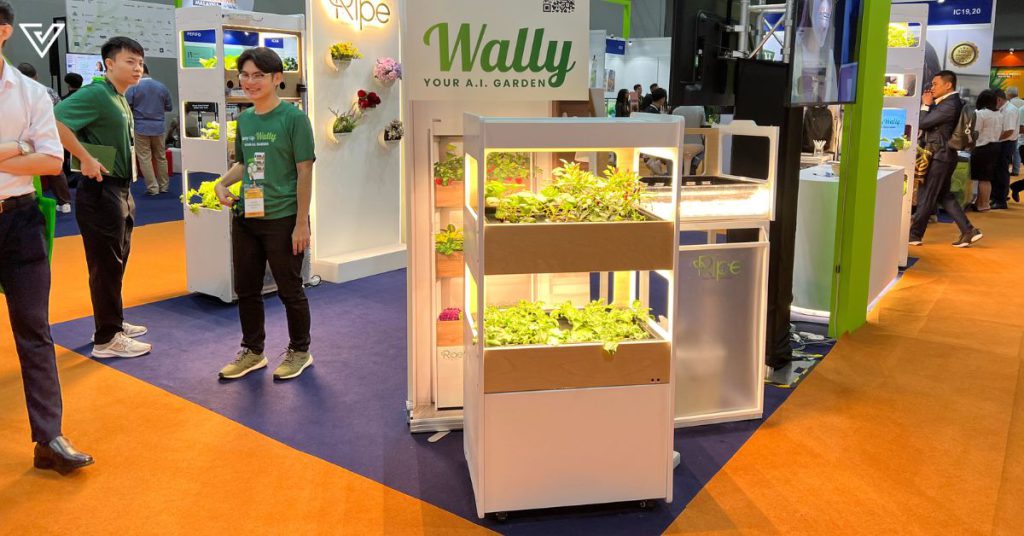
Founded by Malaysians in 2017, Ripe is an agritech startup that creates growing appliances, particularly ones using aeroponics technology.
Other than their own indoor farm in Subang Jaya, Ripe has also developed Wally, a smart vertical farm for indoors. It took them eight years of R&D and an investment of RM3 million to make it happen, Ripe’s website shared.
Inspired by the popular Disney movie Wall-E, RipeFresh’s Wally is an “AI garden” with custom lights, electronics, and high-pressure aeroponics technology.
For those who don’t know, aeroponics is a plant cultivation technique in where the plants’ roots hang suspended in the air while nutrients are delivered to them using a fine mist.
Compared to other vertical farms we’ve seen, this is arguably one of the more beautiful ones. With a Scandinavian design, it’s complete with wooden panels that would complement most homes (or offices) nicely.
5. Maeko
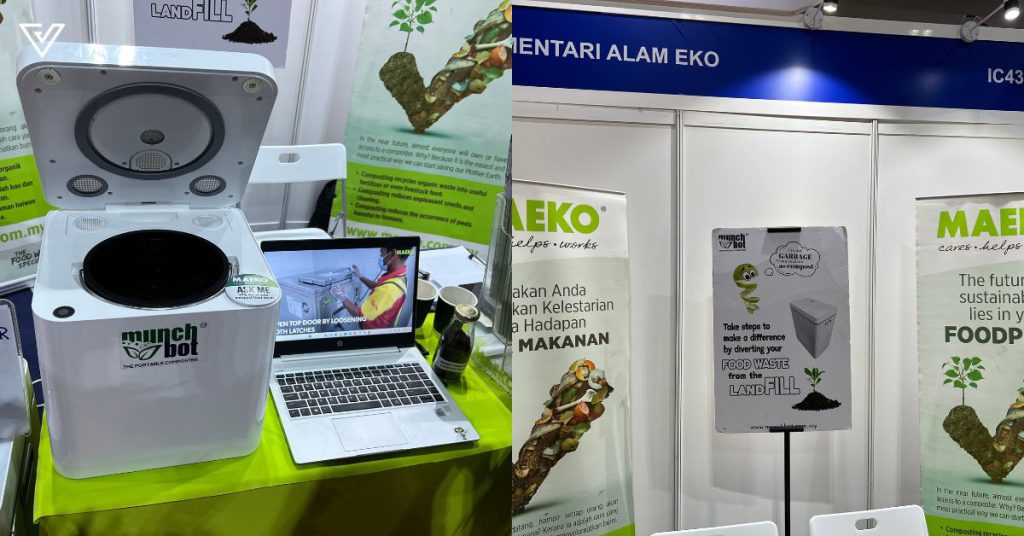
While there are other brands in Malaysia that do compost bins (such as Reencle, which is from South Korea), Maeko’s solution is one that is proudly made in Malaysia.
Maeko, which stands for Mentari Alam EKO, was started by three founders who wanted to solve the issue of food waste through composting.
The startup has developed a variety of enterprise composters that have been used by hotels, supermarkets, factories, and hospitals.
On a commercial level, there’s the MunchBOT. A portable food waste composter, these bins can compost leftovers, including small bones and compostable food packaging.
Using an activator, the MunchBOT can turn the organic waste into fresh compost in 24 hours, and it promises to do so in an odour-free way. The classic MunchBOT costs RM4,980, though, which might be a bit steep for the everyday person.
The team shared with us that there’ll be a smaller, more compact version to be launched in August. This would be a slightly more affordable option.
6. Kairos Agriculture
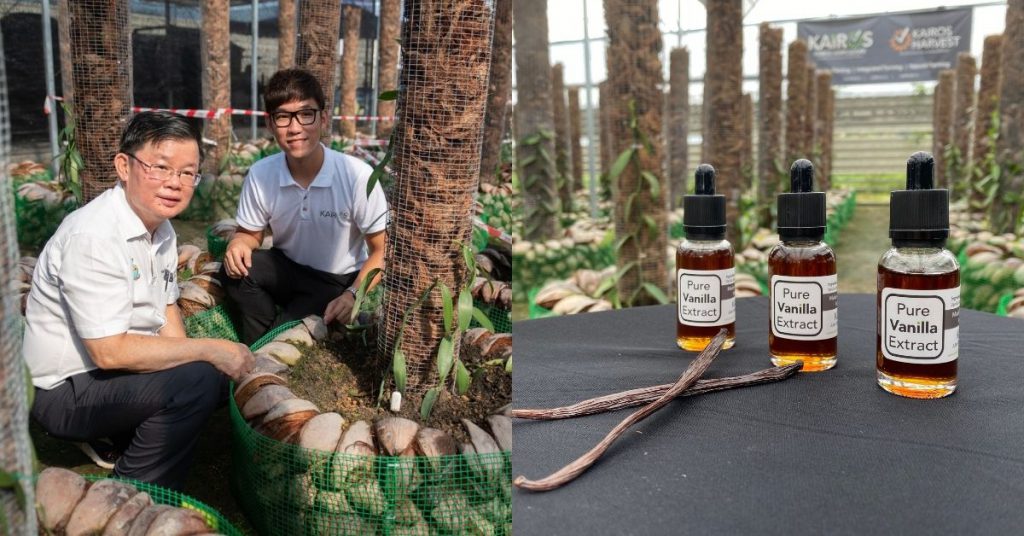 Image Credit: Kairos Agriculture
Image Credit: Kairos AgricultureAnother familiar name to Vulcan Post, Kairos Agriculture is a startup that does vanilla farming using smart agritech systems.
They shared with us in 2021 that the team plans to develop their farm in Penang into an eco-tourism hub that will consist of their farm-to-table café.
True to their words, Kairos Agriculture now does offer an experiential farm tour to their “Vanilla Village”. They seem to have further developed The Vanilla Café, which serves vanilla lattes, smoothies, and ice cream.
We got to try the ice cream, which was mild, sweet, and everything you could want in a classic vanilla ice cream.
Going forward, we hope to see the startup continue to develop its B2C products so that those outside of Penang can get to enjoy their vanilla delights too.
7. HAMI Eco Farms
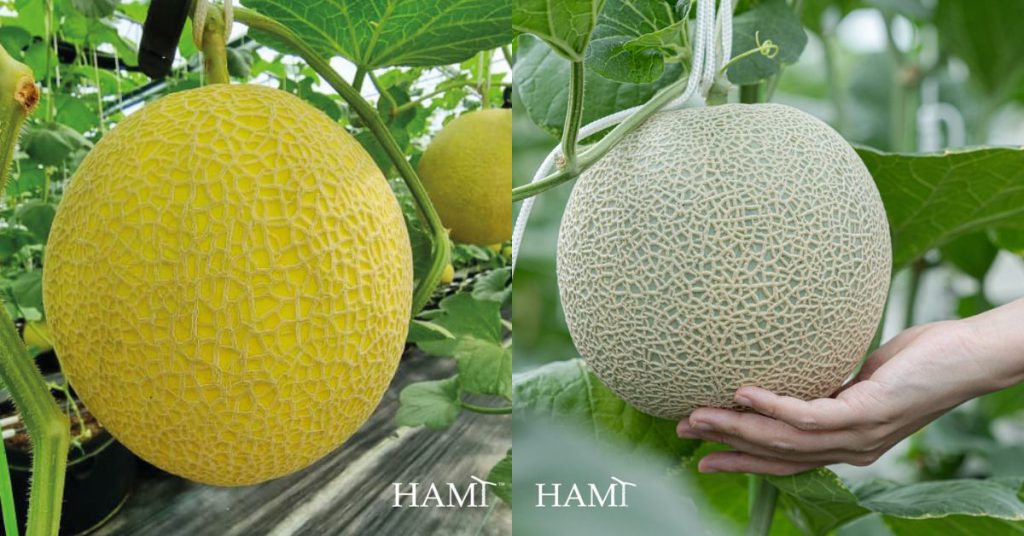 Image Credit: HAMI Eco Farms
Image Credit: HAMI Eco FarmsA farm in Ipoh that grows musk melons and passionfruit, HAMI Eco Farms hasn’t made that much of a name for itself yet.
We were told that the team has been operating quietly, with their booth at Food & Drinks Malaysia being the first time they’ve really opened up to the public.
Rather than using hydroponics or other smart systems, HAMI Eco Farms is very focused on natural planting.
In a bid to have more of a circular ecosystem, the staff mentioned to us that the farm is connected to a recycling centre and use compost from it. Furthermore, fruits that aren’t able to be sold are used to create jams and juices.
Down the road, they aim to open up the farms to tours, but for now, the only way to purchase their fruits seems to be via their Facebook page.
8. Fefifo
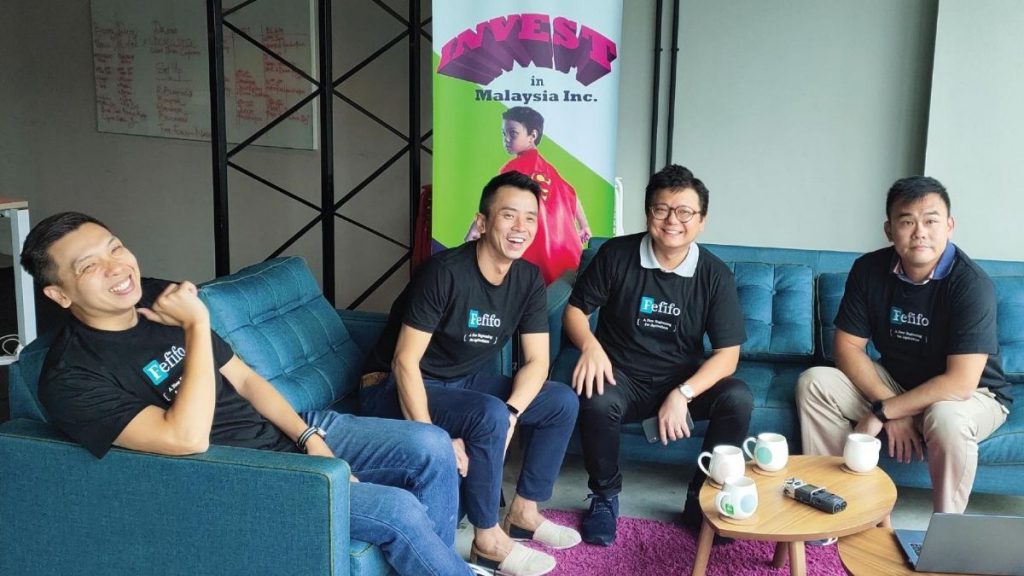 Image Credit: Fefifo
Image Credit: FefifoThink co-working space, except it’s a farm. That’s essentially what Ipoh-based Fefifo is doing.
The business was launched by a founding team of six, who told Vulcan Post in 2020 they simply wanted to solve the problems of their childhood friends who were now smallholder farmers.
Their co-farming solution ended up also addressing Southeast Asian smallholder farmers’ challenges.
“Fefifo removes the biggest barriers to entry and challenges facing smallholder farmers to engage in modern commercial farming through a novel business model of Farmspaces-as-a-Service fee, and crop profit sharing with Fefifo,” Kelveen Soh, the CEO and co-founder said at the time.
Speaking to Alex, the country manager of agricultural operations, we learnt that the team hopes to expand beyond their Perak co-farm down the road to address the needs of more smallholder farmers.
9. Pinxin Vegan Cuisine
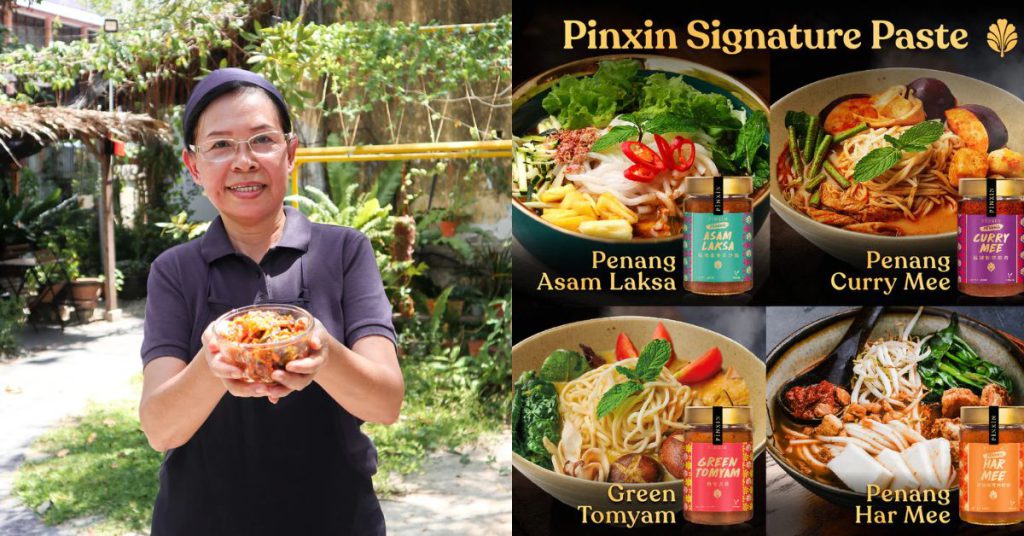 Image Credit: Pinxin Vegan Cuisine
Image Credit: Pinxin Vegan CuisineA vegan restaurant in Penang, Pinxin Vegan Cuisine focuses on serving authentic local dishes through vegan ingredients.
Its founder, Audrey Beh, was quoted on the brand’s website saying, “I spent six years trying to innovate pure vegan cuisine, in order to let vegans taste Penang food that is delicious, healthy, yet easy to prepare.”
Other than its restaurant, there’s also a variety of frozen ready-to-eat selections. This includes dishes including Spicy Asam Fssh (instead of Fish, since it’s not fish), Black Vinegar Hericium Mushroom, and Chai Boey.
Pinxin Vegan Cuisine also carries a variety of pastes such as Penang Hokkien Har Mee Paste, Vegan Sambal Chilli, Penang Curry Mee Paste, and so much more.
We got to test some of its dishes, such as the Mei Cai Hericium Mushroom as well as its Penang Asam Laksa paste, paired with the brand’s own brown noodles.
Both were super flavourful, going against the stereotypes that vegan food is bland or boring.
10. Life Origin
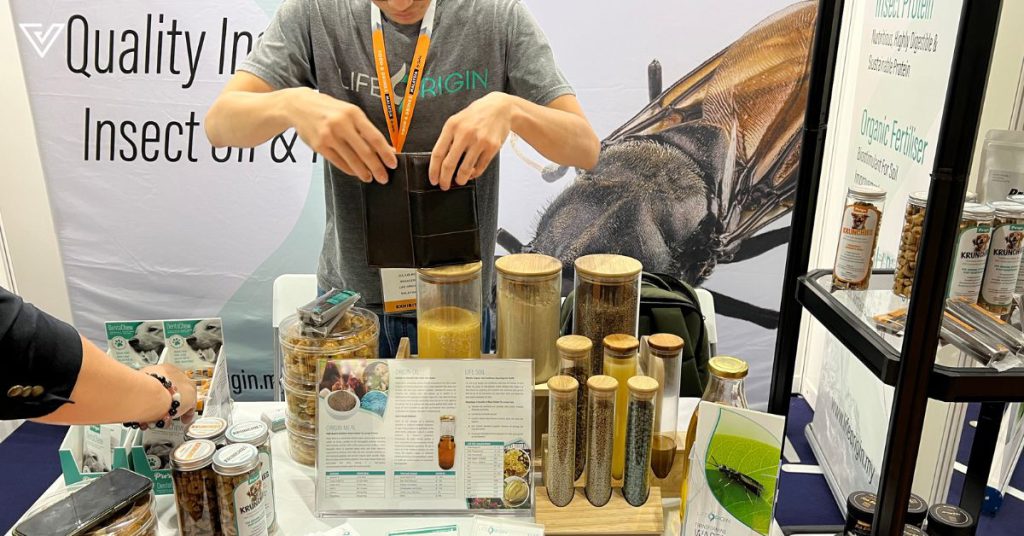 Image Credit: Life Origin
Image Credit: Life Origin A social enterprise that prioritises sustainability, Life Origin produces sustainable protein using BSF larvae.
For now, the startup has created a line of pet products such as an insect oil and protein supplement for dogs. Other than that, the team has also created some fish and shrimp feed.
Moving forward, the team aims to develop food for livestock using their larvae, then eventually food for humans.
The team told Vulcan Post at the event that Life Origin has an ongoing ECF campaign currently, which will help them continue their work with sustainable protein.
11. Eartheories
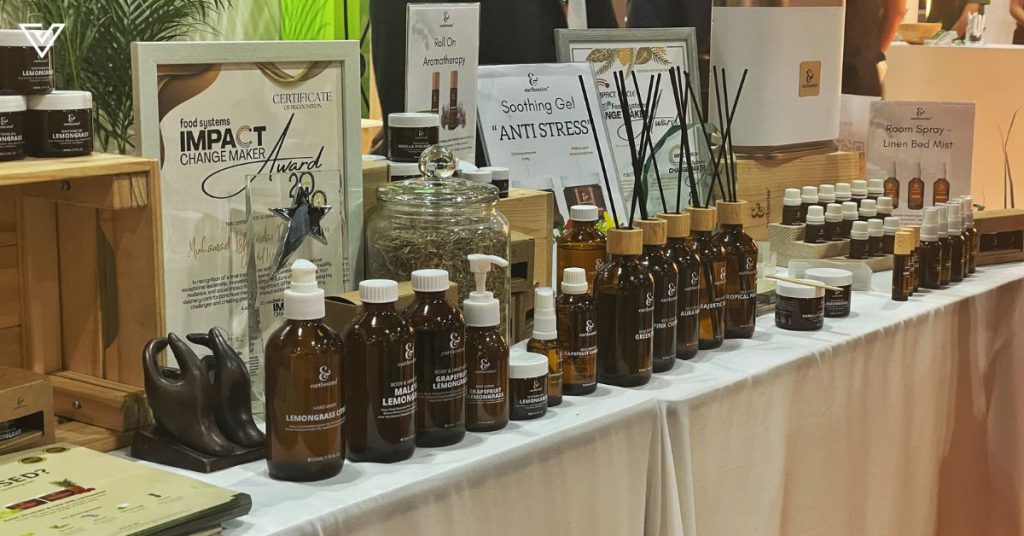
The story of Eartheories, an aromatherapy essential oils brand, started in a home garden.
Founded by entrepreneur Fadzli Subari, the tale goes that he was harvesting homegrown lemongrass when he was struck by a “what if” moment.
This led to him developing lemongrass-based products, using traditional Malay heritage recipes to formulate artisanal aromacare products that heal the body, mind, and spirit.
“There are now more than a hundred blends of aromacare products curated with emphasis on the remedial properties of each carefully selected ingredient,” its website states.
The products are proudly made in Malaysia, with the team pushing an “agri-sanal” ecology. A portmanteau of “agriculture” and “artisanal”, Eartheories supports local farmers by sourcing ingredients from them.
According to an article by Bernama, it seems that Fadzli also aims to engage with youths and teach them to cultivate the plants needed in the essential oils industry.
12. Vive
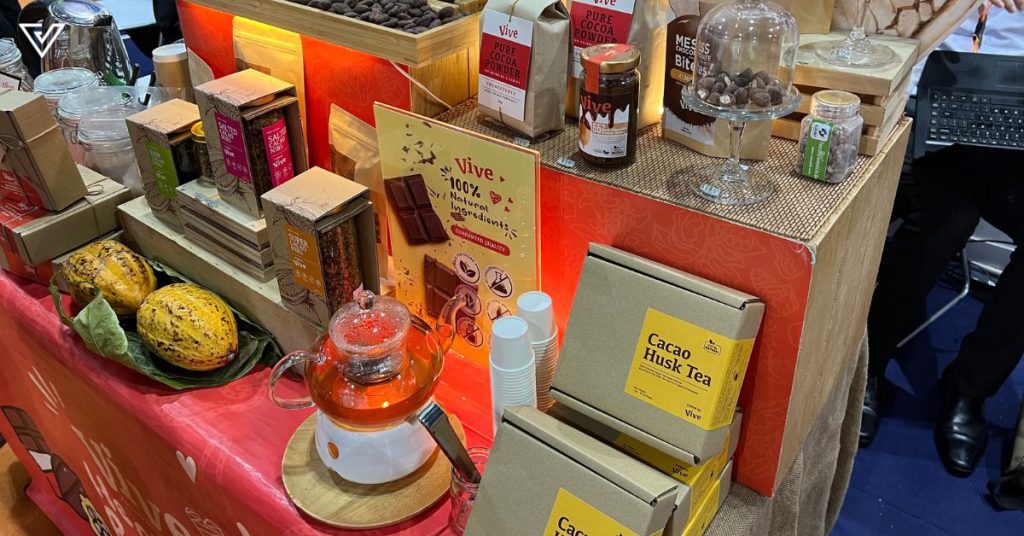
At first glance, VIVE SNACK (Vive) doesn’t seem like anything too out there. It appeared to be yet another chocolate brand, which Malaysia isn’t really short of.
However, Vive differs in some ways, namely in its involvement throughout the whole bean-to-bar process.
After sourcing the beans ethically from all over Malaysia, Vive also handles the fermentation, drying, roasting, grinding, tempering, and packaging of the final products.
Vive’s chocolates are dairy-free, gluten-free, and sugar-free with no preservatives, making them appropriate for those with diabetes and those on a keto diet.
The brand also makes use of the cacao’s husk to make a cacao husk tea which tastes very mildly of dark chocolates.
The future of food in Malaysia
There were lots of other homegrown brands we spotted at Food & Drinks Malaysia. Most interesting was Nanka, a jackfruit-based meat brand that we’ve featured in the past. Curiously, despite its work in alternative protein, this brand was not in the Future of Food and Agriculture Pavillion.
Speaking to EcoEdge, a Singapore-headquartered biotech startup that turns organic waste into high-grade topsoil, we learnt that the booths at the trade show were relatively affordable and opened up lots of doors to the team.

Other than the booths, there were also meeting rooms, pitch sessions, and conferences held over the course of the three-day fair. These aimed to educate entrepreneurs as well as give startups a platform to grow their brands.
With this being Food & Drinks Malaysia’s inaugural exhibition, we found it to be really well done, bolstered by SIAL’s international acclaim. We hope to see more like this in the future to really highlight local movers and shakers in the F&B industry, especially the future-thinking ones.
Learn more about Food & Drinks Malaysia here. Read other articles we’ve written about Malaysian startups here.
 Tekef
Tekef 







